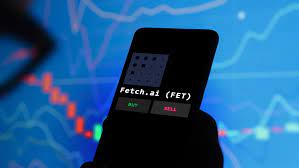The convergence of Bitcoin and Fetch.ai’s autonomous agents signifies a captivating collision between two state-of-the-art technologies within the blockchain and decentralized ecosystem. Historically, Bitcoin has garnered recognition as a digital store of value and a medium for wealth transfer. However, quantum ai introduces a transformative aspect through its autonomous agents, which are meticulously crafted to infuse automation and intelligence into diverse decentralized applications. This innovation has the potential to fundamentally reshape our understanding and utilization of cryptocurrencies. In the forthcoming discussion, we will delve into this convergence comprehensively, shedding light on the profound implications, promising opportunities, and the challenges it brings to the forefront.
Bitcoin’s Evolution: Beyond Digital Gold
Historical context of Bitcoin as a store of value
Bitcoin’s journey began as a groundbreaking concept in 2008 when an anonymous entity known as Satoshi Nakamoto published the Bitcoin whitepaper. It was positioned as “A Peer-to-Peer Electronic Cash System,” emphasizing its potential as a digital currency for direct transactions. However, over the years, Bitcoin has evolved into more of a store of value, akin to digital gold. Its limited supply and decentralized nature have made it attractive to investors and institutions seeking a hedge against inflation and economic instability.
Bitcoin’s potential for wider adoption as a medium of exchange
Despite its success as a store of value, many in the cryptocurrency community believe that Bitcoin can still fulfill its original promise as a medium of exchange. Layer 2 scaling solutions like the Lightning Network aim to enhance Bitcoin’s transaction capabilities, making it more practical for everyday use. The collision with Fetch.ai’s autonomous agents could contribute to this evolution by enabling automated and intelligent transactions.
The challenges and limitations of Bitcoin’s current state
While Bitcoin’s growth has been impressive, it faces several challenges, including scalability issues, energy consumption concerns, and regulatory scrutiny. These challenges can hinder its broader adoption and use as a medium of exchange. The integration of Fetch.ai’s technology could address some of these challenges by introducing automation and efficiency to the Bitcoin ecosystem.
Fetch.ai’s Autonomous Agents: A New Frontier
Exploring the concept of autonomous agents in the context of blockchain
Autonomous agents are software entities capable of making decisions and taking actions independently based on predefined rules and objectives. In the blockchain context, these agents can interact with smart contracts, other agents, and the broader ecosystem to execute tasks efficiently. Fetch.ai’s approach to autonomous agents involves a decentralized network of agents that collaborate to achieve complex goals, such as optimizing supply chains or managing decentralized finance (DeFi) protocols.
Fetch.ai’s unique approach to decentralized autonomous agents
Fetch.ai stands out in the blockchain space with its unique approach to autonomous agents. Their agents are designed to be self-organizing and capable of learning from their interactions with the environment. This adaptability makes Fetch.ai’s agents versatile and well-suited for a wide range of applications, from predicting traffic patterns to optimizing energy usage in smart cities.
Real-world applications of Fetch.ai’s technology beyond cryptocurrencies
Fetch.ai’s autonomous agents have found applications in various industries beyond cryptocurrencies. For instance, in healthcare, they can optimize patient appointment scheduling, while in logistics, they can improve the efficiency of delivery routes. The collision with Bitcoin opens up possibilities for combining the value transfer capabilities of Bitcoin with Fetch.ai’s agents’ intelligence, creating new avenues for innovation.
Synergy or Conflict: How Bitcoin and Autonomous Agents Interact
Analyzing the potential benefits of integrating autonomous agents with Bitcoin
The integration of autonomous agents with Bitcoin has the potential to bring several benefits. One key advantage is the automation of complex financial transactions. For example, Fetch.ai’s agents could facilitate decentralized exchanges (DEXs) on the Bitcoin network, automating order matching and trade execution while ensuring security and transparency.
Identifying potential conflicts and challenges in this collision
However, the collision of Bitcoin and autonomous agents is not without challenges. These include interoperability issues, scalability concerns, and potential conflicts between the decentralized nature of Bitcoin and Fetch.ai’s agent network. Achieving a seamless integration will require careful planning and technical innovations.
Case studies of projects leveraging both Bitcoin and Fetch.ai’s agents
Several projects are already exploring the possibilities of combining Bitcoin and Fetch.ai’s agents. Case studies of such projects, including their successes and challenges, can shed light on the real-world potential of this convergence. These projects may involve decentralized financial services, automated trading, and intelligent asset management.
The Promise of Smart Contracts and Oracles
Introduction to smart contracts and oracles in the blockchain space
Smart contracts are self-executing agreements with the terms of the contract directly written into code. Oracles, on the other hand, provide external data to smart contracts, enabling them to interact with the real world. Combining Bitcoin, smart contracts, and Fetch.ai’s agents can open up new possibilities for creating decentralized applications (DApps) that are both secure and intelligent.
How Fetch.ai’s agents can enhance the functionality of smart contracts
Fetch.ai’s agents can act as decentralized oracles, providing real-time data to Bitcoin-based smart contracts. This capability can enable the creation of more sophisticated financial instruments and DApps. For instance, decentralized insurance contracts could automatically assess claims using real-world data fed by Fetch.ai’s agents.
Examples of decentralized applications combining Bitcoin, smart contracts, and autonomous agents
Exploring existing and potential DApps that leverage this combination can provide insights into the practicality and versatility of the collision between Bitcoin and Fetch.ai’s agents. Examples may include decentralized prediction markets, automated portfolio management, and supply chain optimization.
Regulatory and Privacy Considerations
Regulatory challenges and implications of autonomous agents in the Bitcoin ecosystem
As autonomous agents gain prominence in the blockchain space, regulatory bodies may seek to establish guidelines and rules to govern their behavior. Understanding these regulations and their impact on Bitcoin transactions involving autonomous agents is crucial for compliance and legal clarity.
Ensuring privacy and security when combining these technologies
Privacy and security are paramount in both the Bitcoin and autonomous agent ecosystems. Exploring encryption techniques, privacy-preserving technologies, and security best practices can help users and developers navigate the intersection of these technologies safely.
Global perspectives on the legal framework for this collision
Different regions may have varying perspectives on the legal framework for Bitcoin and autonomous agents. Examining global regulatory approaches and potential areas of convergence or divergence can provide valuable insights for businesses and individuals operating in this space.
Future Possibilities and Challenges
Speculating on the future of Bitcoin and autonomous agents
The collision of Bitcoin and Fetch.ai’s autonomous agents opens up exciting possibilities for the future of decentralized finance, decentralized autonomous organizations (DAOs), and more. Speculating on the potential developments, such as AI-driven investment strategies and decentralized autonomous corporations, can ignite curiosity and innovation in the blockchain community.
Potential innovations and disruptions in finance, IoT, and beyond
Beyond financial applications, the convergence of Bitcoin and Fetch.ai’s agents has the potential to disrupt various industries. It may lead to advancements in IoT (Internet of Things) connectivity, supply chain optimization, and energy management. These innovations could redefine how businesses operate and interact with their ecosystems.
Addressing the ongoing technical, ethical, and societal challenges
As the collision of Bitcoin and Fetch.ai’s agents unfolds, addressing ongoing challenges is crucial. These challenges include technical issues like scalability, ethical considerations surrounding autonomous decision-making, and broader societal implications of decentralized systems. Ongoing research and collaboration will be essential in navigating these complex issues.
Conclusion
In conclusion, the convergence of Bitcoin and Fetch.ai’s autonomous agents represents a compelling fusion of two transformative technologies. While Bitcoin continues to evolve from digital gold to a medium of exchange, Fetch.ai’s agents introduce automation and intelligence to the blockchain space. This collision holds the promise of enhancing Bitcoin’s functionality, enabling innovative applications, and reshaping industries. However, it also presents challenges that must be carefully addressed. As the collision unfolds, stakeholders must collaborate, innovate, and remain vigilant to ensure that this collision results in a positive impact on the blockchain and decentralized ecosystem.





Be First to Comment